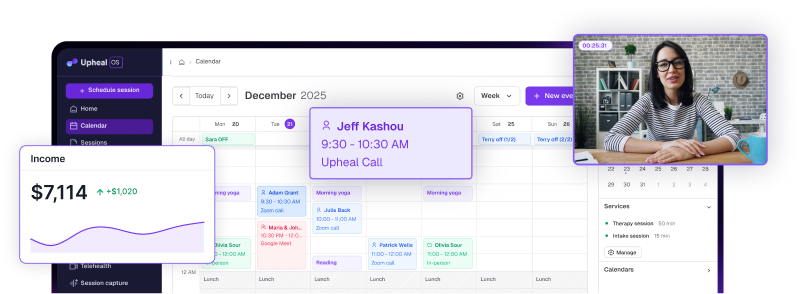Just where could AI-powered therapy take us?
.avif)
Hi, I’m Michael, and these days I’m a Clinical Psychologist. But once upon a time, I wanted to write a sci-fi novel. So this is a question that’s close to my heart.
With the arrival of AI, nothing will ever be the same again. Including, presumably, therapy. So, if therapy is about to get an upgrade, what might it look like? The only thing we can be sure of is that it won't be quite what we expect.
The main thing that you’ll be using Upheal for right now is your therapy notes. And those are only going to get better. Perhaps soon you’ll be able to train the AI yourself. Just type a few sets of notes from your sessions, and the AI will analyze how you did it, and start turning them out itself in exactly your style. It would almost be creepy if it weren’t so cool.
And the Natural Language Processing won’t stop there. It will go beyond the notes, to analyze the session itself and tell you what’s going on in finer and finer detail, and perhaps even in real-time.
You, but even better
Ever realized after a session that you missed something? Or not been sure what you missed, when the client doesn’t come back? Perhaps before too long the AI will tell you right when it’s happening, and give you a blaring siren and a big flashing sign saying “Avoidance!”, or “Rupture!” (Or perhaps something more discreet).
It will be reading language, and also posture, eye moments, and expression. Throw in some measurements of biomarkers via wearables – heart rate, skin conductance, and the like – and you’ll be able to count on Upheal to spot anything you miss.
And while spotting things is great, suggesting things will be even better, because sometimes we all get caught flatfooted in a session and don’t know what to do next.
How about an unobtrusive suggestion from the AI based on the latest research and a personalized analysis of how you and the client like to work? Perhaps it will tell you what the client is really feeling. Or suggest that you pause and do some breathwork. It’ll be like having an expert supervisor whispering in your ear. Except one that won’t take offense if you ignore its suggestions.
Beyond you and your clients
It’s likely the benefits will go beyond you and your clients. Huge datasets (anonymized, of course) and AI-powered analysis will supercharge research on therapy, which until now has been limited to the speed at which therapists can transcribe sessions and then analyze the transcripts.
Big Therapy Data is going to tell us more than we ever dreamed was possible about exactly what works in therapy, how, and for whom. And then it can be fed back into your work, via Upheal and personalized recommendations for which therapist and approach would work best for this specific client, given the research base and what the AI knows about the client.
So far, so exciting. But we’re still in the same old therapy room (or video-conferencing platform), doing the same old thing: talking. Which is great, but not really the best we can imagine.
Into the sci-fi future
Ready? Try this instead. You are hard at work, being the therapist you always dreamed of being. You are Gandalf, with pointy hat and long staff, deep in Mirkwood. Your client is with you, as the Hobbit Bilbo Baggins. You wouldn’t usually want to come here, but that’s the point, because this is where the giant spiders live, and your client has a spider phobia.
Which wouldn’t be too much of a problem where you live IRL, which is a space colony orbiting Mars, but your client is back on Earth, where the spiders have got quite a bit bigger in recent years, as an unforeseen side effect of the brilliant solution to Climate Change that ChatGPT10 came up with in 2038. So, here you are, in the metaverse, doing some exposure work.
Your client is scared, and of course, that’s what’s needed, but you can see from the ever-shifting contour map of his biomarker readout, in the corner of your vision, that it’s going a bit too far – he’s getting overwhelmed. So, with a small hand gesture, you slightly increase the dose of MDMA-6 that is being delivered directly to his brain via a feed of nanotherapy-bots.
And if that doesn’t fix the problem, you can simply direct his headset (back in the real world on Earth) to magnetically tweak his brainwaves, to relax him a little. It’s great being a therapist in 2045.
And beyond…
We’re beyond the realm of my imagination, and into the unknown of our sci-fi future. Perhaps we won’t need therapy anymore, when our brains can be analyzed and reconfigured to give us whatever mental states we choose. Perhaps we won’t even have brains after we upload ourselves into the metaverse. And perhaps I’ll be out of a job. But would that be so bad? If AI can someday help people better than I can, then far be it from me to get in the way.
I will happily retire to a virtual fin de siecle Vienna, to commiserate and smoke cigars with an AI-generated Freud, for the rest of my 10,000-year artificially-extended lifespan. But for the time being and a good while to come, I expect to be working alongside AI, using it as best I can to deliver ever-better care.
In the end, it’s all about doing the best work we can, wherever we work and whatever kind of therapy we do. And if Upheal can help with that, then I for one am on board.











